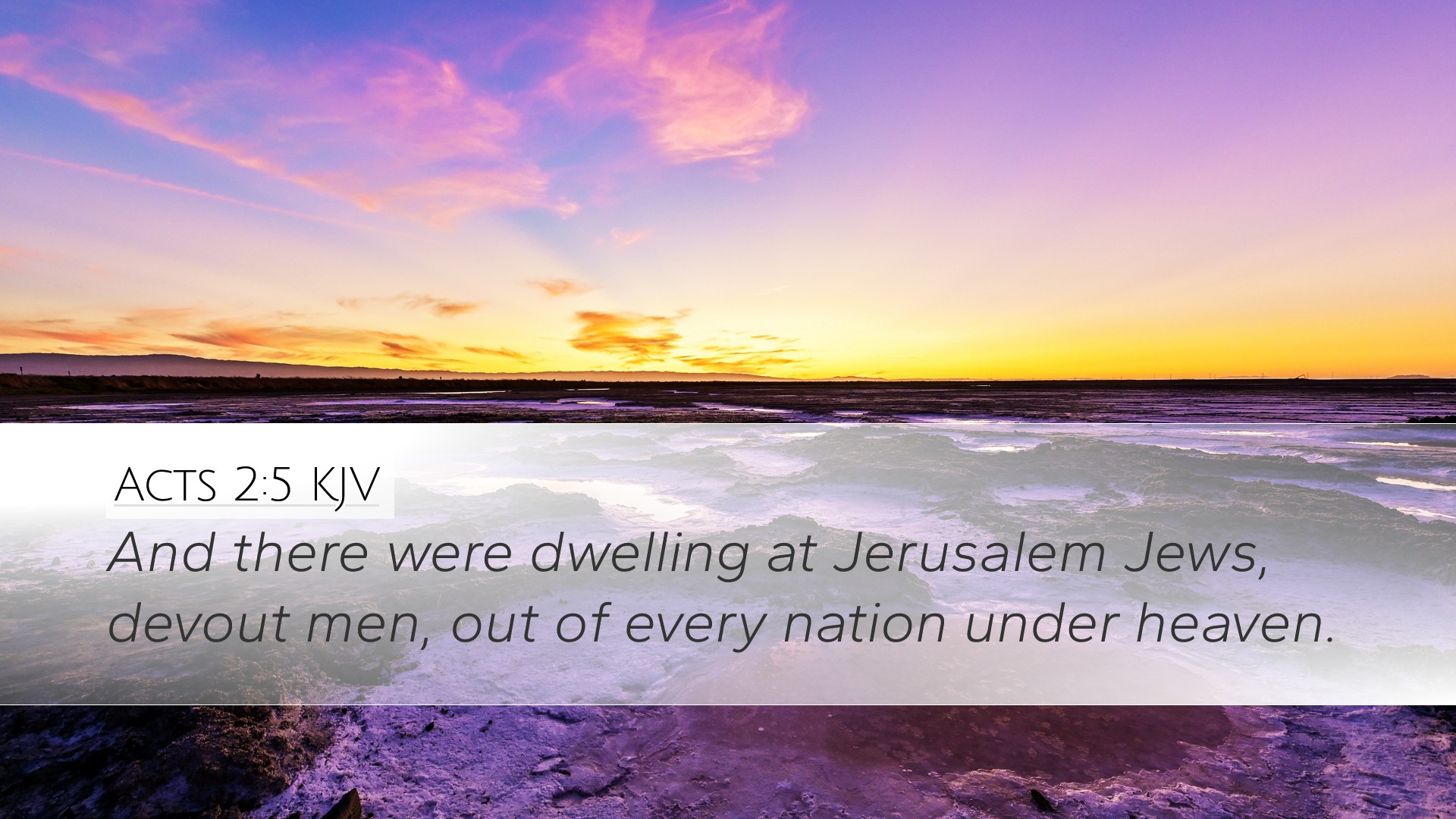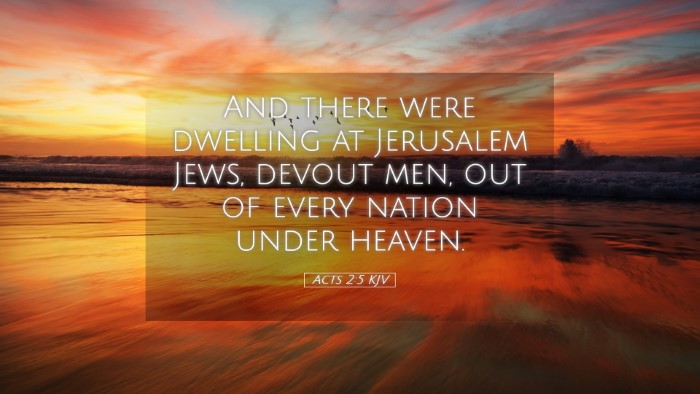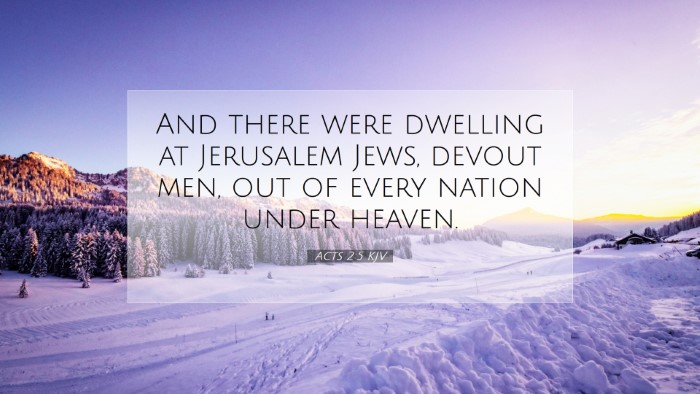Acts 2:5 Commentary
Bible Verse: "And there were dwelling at Jerusalem Jews, devout men, out of every nation under heaven."
Introduction
Acts 2:5 serves as a significant verse within the context of the Pentecost event, illustrating the diverse assembly of people who witnessed the outpouring of the Holy Spirit. This verse highlights the multicultural and multivariate character of early Christian witness, essential for understanding the subsequent events and sermons that follow.
Contextual Background
Understanding Acts 2:5 requires some knowledge of the book's setting. Written by Luke, the Acts of the Apostles chronicles the birth and growth of the early Church. The events on the day of Pentecost are pivotal, representing the initial outpouring of the Holy Spirit on believers. The presence of "Jews, devout men, out of every nation under heaven" illustrates God's intention to reach all of humanity, emphasizing the universal scope of the gospel.
Insights from Matthew Henry
Matthew Henry notes the divine providence in gathering these devout Jews, who were not only religiously observant but also culturally representative of the vast dispersion of the Jewish people. He emphasizes that their presence in Jerusalem, especially during the Feast of Pentecost, served as a strategic moment for the Holy Spirit to initiate the proclamation of the Gospel. According to Henry, this mix of nationalities allowed for a wider dissemination of the message, foreshadowing the spread of Christianity beyond Jerusalem.
- The Importance of Devotion: Henry points to the term "devout" to signify spiritual dedication among these men, indicating that the Holy Spirit was to be poured out upon those genuinely seeking God.
- Diversity and Unity: The assembly of people from every nation symbolizes the unifying power of the Holy Spirit, preparing the way for the Church's mission.
Insights from Albert Barnes
Albert Barnes provides additional insight into the significance of the term “Jerusalem.” He explains that as the epicenter of Jewish faith and practice, the city was chosen by God for the outpouring of the Spirit, indicating a fulfillment of prior prophecies. Barnes emphasizes the importance of the Jewish holiday of Pentecost (Shavuot) when Jews from across the known world would pilgrimage to this holy city, thus ensuring a large audience for the Christian message.
- God's Strategic Timing: Barnes reflects on the divine timing of events, with Jerusalem being filled with Jews at a time when they would be most receptive to the message of Christ.
- Symbol of Gathering: He further notes that the gathering of nations represents the culmination of God’s plan for the inclusion of all humanity in salvation.
Insights from Adam Clarke
Adam Clarke’s commentary adds a practical understanding of the implications of this verse, particularly regarding the cultural and linguistic multiplicity of the crowd present. He emphasizes that such diversity was not only a natural occurrence but the fulfillment of God’s promise to Abraham that through his seed all nations would be blessed. Clarke explores the idea that this moment marks a significant turn in the covenant relationship, extending beyond Israel to the Gentiles.
- Global Reach of the Gospel: Clarke underlines how the diverse crowd symbolizes the global nature of the Gospel mission initiated by the apostles, reminding readers that the Church is called to be a witness to all people.
- Spiritual Awakening: He also points out that the presence of devout men signifies a readiness for spiritual awakening, highlighting that the acknowledgment of spiritual need is crucial for receiving the Holy Spirit.
Theological Implications
Acts 2:5 sets a theological precedent for understanding the community of faith as inclusive. This diversity represents the breaking down of barriers that previously separated individuals based on ethnicity, nationality, and language. The subsequent message of Peter, empowered by the Holy Spirit, aims to translate this experience into a calling for all nations to repent and believe in Christ.
- Unity in Diversity: The early Church’s model, as seen through this verse, becomes a prototype for modern congregations, showcasing that true fellowship transcends geographic and cultural borders.
- Mission Mandate: The gathering becomes a blueprint for church missions—empowered by the Spirit to reach all corners of the earth with God's inclusive love and salvation.
Practical Application
For pastors, students, and theologians, Acts 2:5 encourages an examination of their local church demographics and mission focus. The call for diversity within congregations challenges church leaders to embrace all peoples, fostering an environment that reflects the kingdom of God.
- Cultural Sensitivity: Emphasizing the need for cultural sensitivity in ministry allows for a richer expression of worship and community life.
- Preparation for Outreach: Just as the devout men were gathered in Jerusalem, churches today are challenged to seek out and gather diverse groups for worship and mission endeavors actively.
Conclusion
Acts 2:5 not only narrates a historical event but sets forth key themes of diversity, unity, and divine sovereignty. The insights from Matthew Henry, Albert Barnes, and Adam Clarke provide depth to the understanding of this verse, encouraging deeper engagement with the text. As we reflect upon this verse, let us grasp the beautiful reality that the Church is crafted from all nations, called to proclaim the marvelous works of God in the power of the Holy Spirit.


